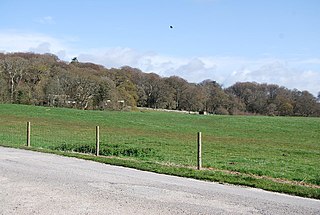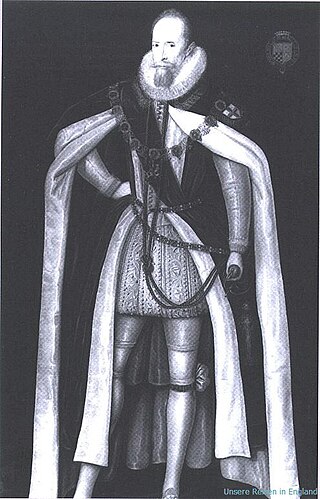Thomas or Tom Howard may refer to:

Earl of Lichfield is a title that has been created three times, twice in the Peerage of England and once in the Peerage of the United Kingdom (1831). The third creation is extant and is held by a member of the Anson family.
The Peerage of the United Kingdom is one of the five Peerages in the United Kingdom. It comprises most peerages created in the United Kingdom of Great Britain and Ireland after the Acts of Union in 1801, when it replaced the Peerage of Great Britain. New peers continued to be created in the Peerage of Ireland until 1898

Earl of Suffolk is a title which has been created four times in the Peerage of England. The first creation, in tandem with the creation of the title of Earl of Norfolk, came before 1069 in favour of Ralph the Staller; but the title was forfeited by his heir, Ralph de Guader, in 1074. The second creation came in 1337 in favour of Robert de Ufford; the title became extinct on the death of his son, the second Earl, in 1382. The third creation came in 1385 in favour of Michael de la Pole. The fourth creation was in 1603 for Lord Thomas Howard, the second son of Thomas Howard, 4th Duke of Norfolk, by his second wife Margaret Audley, the daughter and eventual sole heiress of Thomas Audley, 1st Baron Audley of Walden, of Audley End in the parish of Saffron Walden in Essex. Howard was a prominent naval commander and politician and served as Earl Marshal, as Lord Chamberlain of the Household and as Lord High Treasurer. In 1597 he was summoned to Parliament as Baron Howard de Walden, and in 1603 he was further honoured, at the start of the reign of King James I, when he was created Earl of Suffolk. His second son the Hon. Thomas Howard was created Earl of Berkshire in 1626.
Viscount Howard of Bindon was a title in the Peerage of England. It was created in 1559 for Thomas Howard, second son of Thomas Howard, 3rd Duke of Norfolk. His two sons, the second and third Viscount, both succeeded him in the title. As neither had any male children, the title became extinct on the death of the third Viscount in 1611. The title referred to Bindon Abbey in Dorset.
The Lord Lieutenant is the monarch's representative in the English county of Dorset.

Lulworth Castle, in East Lulworth, Dorset, England, situated south of the village of Wool, is an early 17th-century hunting lodge erected in the style of a revival fortified castle, one of only five extant Elizabethan or Jacobean buildings of this type. It is listed with Historic England as a scheduled monument. It is also Grade I listed. The 18th-century Adam style interior of the stone building was devastated by fire in 1929, but has now been restored and serves as a museum. The castle stands in Lulworth Park on the Lulworth Estate. The park and gardens surrounding the castle are Grade II listed with Historic England.

William Cecil, 2nd Earl of Salisbury,, known as Viscount Cranborne from 1605 to 1612, was an English peer, nobleman, and politician.
This is a list of people who have served as Custos Rotulorum of Dorset.

The Lulworth Estate is a country estate located in central south Dorset, England. Its most notable landscape feature is a five-mile stretch of coastline on the Jurassic Coast, a World Heritage Site, including Durdle Door and Lulworth Cove.

Bindon Abbey (Bindonium) was a Cistercian monastery, of which only ruins remain, on the River Frome about half a mile east of Wool in the Purbeck District, Dorset, England.
The Vice-Admiral of Dorset was responsible for the defence of the County of Dorset, England.

Sir Arthur Gorges was an English sea captain, poet, translator and courtier from Somerset.

Thomas Howard, 1st Viscount Howard of Bindon was an English peer and politician.
Sir Edmund Ludlow was an English landowner and politician who sat in the House of Commons at various times between 1571 and 1622.

John Marney, 2nd Baron Marney of Layer Marney, Essex was an English Member of Parliament and Governor of Rochester Castle.
Henry Howard, 2nd Viscount Bindon, aristocrat and courtier

John Strode, the son of Robert Strode of Parnham, Dorset and Elizabeth Hody, was elected MP for Dorset in 1572 and was Sheriff of Dorset from 1572 to 1573.
Humphrey Weld, DL, JP was an English lawyer, member of the Royal household, public official, landowner and property administrator who was elected to the House of Commons for Christchurch in Hampshire in 1661. Weld was a crypto-recusant who kept his religious allegiance secret in order to stay in public office during a turbulent political period in English history. He was appointed Cup-bearer to the Catholic Queen Henrietta Maria 1639-44 and later as Gentleman of the Privy Chamber 1668-85 under her son, Charles II. He served as a magistrate and in numerous other public roles in London, Middlesex, Cambridgeshire, Hampshire and in Dorset, where he was governor of Portland Castle. In 1641 he bought the Lulworth Estate in Dorset where he started the "Lulworth" line of the (recusant) Weld family which has continued for over 350 years.

William Thornhurst (1575-1606) was an English landowner.











